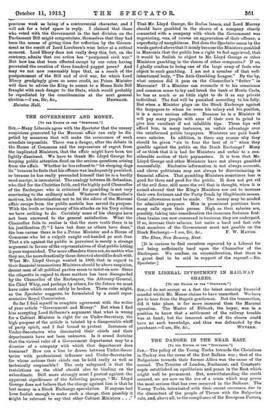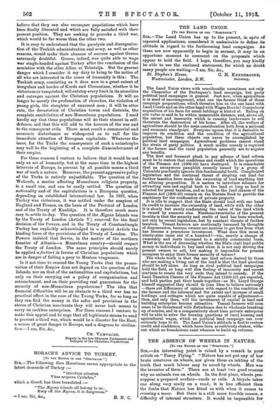THE DANGER IN THE NEAR EAST.
[To THE EDITOR OF THE "SPECTATOR."] SIR,—The policy of the Young Turks towards the Christians in Turkey was the cause of the first. Balkan war ; that of the Bulgarians towards their former Allies was the cause of the second. The Treaties of London, Bucharest, and Constanti- nople established an equilibrium and peace in the East which might well be permanent. But, notwithstanding the result secured, we are now on the eve of a crisis which may prove the most serious that has ever occurred in the Balkans. The Young Turks, intoxicated with their recent successes, due to the discontent of the people of Thrace with the Bulgarian rule, and, above all, to the compliance of the European Powers,
believe that they can also reconquer populations which have been finally liberated and which are fully satisfied with their present position. They are seeking to provoke a third war, which would be far worse than the other two.
It is easy to understand that the paralysis and disorganiza- tion of the Turkish administration and army, as well as other reasons, would make their chances of success against Greece extremely doubtful. Greece, indeed, was quite able to wage war single-handed against Turkey after the conclusion of the armistice with the other Allies at Tchatalja. But the gravest danger which I consider it my duty to bring to the notice of all who are interested in the cause of humanity is this : The Turkish army, consisting as it does now to a great extent of irregulars and hordes of Kurds and Circassians, whether it be victorious or vanquished, will outstep every limit in its atrocities and outrages against the Christian populations. It will no longer be merely the profanation of churches, the violation of young girls, the slaughter of unarmed men; it will be utter ruin, the devastation of Christian towns and districts, the complete annihilation of non-Mussulman populations. I need hardly say that these populations will do their utmost in self- defence, and that this will add to the horrors of the war and to the consequent evils. There must result a commercial and economic disturbance so widespread as to call for the immediate attention of European capitalists. Whatever the issue, for the Turks the consequence of such a catastrophe may well be the beginning of a complete dismemberment of their empire.
For these reasons I venture to believe that it would be not only an act of humanity, but at the same time in the highest interests of Europe, to prevent by all possible means a third war of such a nature. Moreover, the present aggressive policy of the Turks is entirely unjustifiable. The question of the Wakoufs, a matter affecting Mussulman religious property, is a small one, and can be easily settled. The question of nationality and of the capitulations is a European question, depending on established international law. In 1897, when Turkey was victorious, it was settled under the auspices of England and France, on the basis of the Protocol of London and of the Treaty of Kanlidja. It is therefore much more easy to settle to-day. The question of the lEgean Islands was by the Treaty of London (Article V.) reserved for the final decision of the Powers, and in the Treaty of Constantinople Turkey has explicitly acknowledged in a special Article the binding force of the provisions of the Treaty of London. The Powers insisted that Servia, in the matter of the northern frontier of Albania—a Mussulman country—should respect the Treaty of London. The same principles should surely be applied a fortiori in favour of Christian populations which are in danger of falling a prey to Moslem vengeance.
Is it not time to remind the Young Turks that the preser- vation of their Empire does not depend on the question of the Islands, nor on that of the nationalities and capitulations, but only on their carrying out a policy of reorganization and retrenchment, and on their providing real guarantees for the security of non-Mussulman populations ? The idea that financial difficulties will be an obstacle to a third war has no practical effect in the case of the Young Turks, for so long as they can find the money in the safes and provisions in the stores of Christian merchants they will never lack means to carry on reckless enterprises. For these reasons I venture to make this appeal and td urge that all legitimate means be used to prevent a third war, which would be a disaster for the East, a. source of great danger to Europe, and a disgrace to civiliza- tion.—I am, Sir, &c.,
CH. VAMVACAS,
Deputy in the late Ottoman Parliament and Delegate of the Christian Populations,















































 Previous page
Previous page